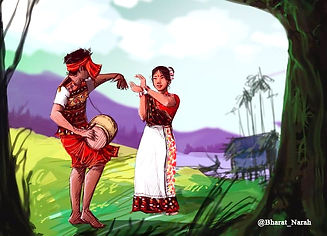


FESTIVALS
Misings celebrate two agricultural festivals: one, named ‘Ali-ai-Lígang’ meaning first sowing or planting of roots or seeds is the prime festival of the Misings. It is celebrated in the spring season with pomp and grandeur on the first Wednesday of Fhagun month. Po-rag the post-harvest festival of Misings is a festival of prayers and feast and is celebrated at an interval of 5 years or more. Another occasion, called Dobur, is a ritual performed occasionally by the village community for different purposes, such as to avert a likely crop failure and ensure the general well-being of the community. In addition to the three traditional festivals, the Misings celebrates Bohag Bihu, Magh Bihu, and Kati Bihu.
Ali-A:ye Lígang

It is a sowing festival and literary meaning of ALI-AYE LÍGANG stands for first sowing of roots and fruits in which ALI, stands for roots, AYE for fruits, and LÍGANG for sowing. The oncoming of the 'Ahu' and 'Bau' season is marked with the celebration of ALL-AYE LÍGANG.
The Mising people believe the Wednesday as Lakshmi day, and on that day the head of the family marks the sowing of seeds in their respective fields, with a handful of seeds, a YOKPA, APONG, PURANG, TAKE, PEERO, SI:PAG ONNO, preferably carrying in an ÍGÍN. Using the YOKPA he clears a small patch of land in the easternmost part of the field and is decorated with the PEERO and cotton threads in a square or a circular pattern (size about 2 feet 3 feet). The APONG, PURANG, TAKE, and ST:PAG, are placed at appropriate places within the decorated area. Then the seeds are sown over the area and chant the forefathers SEDI-MÉ:LO, KARSING KARTAG, DO:NYI PO:LO, etc to bear witness the sowing seeds, into the Womb of mother earth for abundant crops, good harvest, etc.
In the daytime, the women get busy preparing APONG and PURANG. In the evening hours, the head of the family again prays their forefather including KOJE_YANGGGO. After the feasting merry-making starts in the form of GUMRAG-SO:MAN.
Po: rag is one of the biggest socio-religious festivals of the Mising people. As it is an expensive affair, it is often celebrated after a good harvest. Preparations for the occasion too take much effort, which is why it is not celebrated annually. A Murong house is necessary for performing this festival. The host village invites the youth organisations from the neighborhood village to participate in every respect of the festival. A priest known as the Mibo is invited who conducts the prayer to SEDI MÉLO, DONI POLO, etc. The celebrations begin with prayers under the leadership of a Mibu (within the absence of Mibus lately, by an elderly person of the village, capable of leading prayers). Pork being an obligatory item on the menu 6-8 pigs are sacrificed in the name of different deities. There must also be plenty of po:ro apong for everyone to drink. The most special feature of this festival is the invitation extended to all women of the village married to men in other places. Prominent people from neighboring villages and native dignitaries too are invited to hitch the feasting and merrymaking occasion. The celebrations go on usually for three days, and feasting and singing and dancing to take place on all three days.
Po:rag

Dobur

Dobur is one of the most important rigid festivals of the Mising people. It may be organised by a single family or collectively by several families. Based on the purpose Dobur can be classified into four kinds, viz. Burté Dobur, Mo:pun Dobur, Ko:son Dobur and Raban Ko:son, of which the most common one is the Burté Dobur. It is observed when someone in the village commits a sin or an offense against some spirit, benevolent or malevolent, especially the latter, which causes, or might cause, great spirit, benevolent or malevolent, especially the latter, which causes, or might cause, great harm and suffering to individuals or the entire community. Mo:pun Dobur and Raban Ko:son relate to the appeasement of spirits for the protection of crops, cows, and hens being sacrificed on this occasion also. Ko:son Dobur is arranged by hunters to appease jungle spirits for success in hunts and prevention of harm that may be caused in the process: only hens are sacrificed on this occasion.